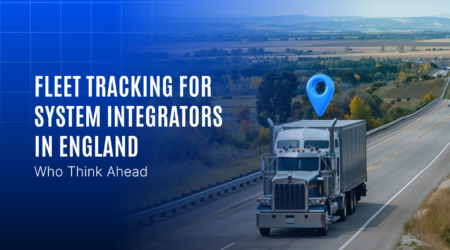Fleet tracking in the UK is rapidly evolving. With increasing pressure on logistics, rising operational costs, regulatory obligations, and growing sustainability goals, businesses that operate vehicles must adapt quickly. Whether in logistics, construction, public services, or waste collection, efficient fleet tracking is no longer optional—it is a business necessity.
This article explores the importance of fleet tracking in the UK, the common challenges faced by both fleet operators and system integrators, the key benefits of implementing a tracking solution, and how modern technologies are shaping the future of UK-based fleet operations.
Understanding Fleet Tracking
Fleet tracking refers to the use of GPS-based and telematics systems to monitor vehicle locations, driver behavior, trip routes, fuel consumption, vehicle load, maintenance needs, and other operational metrics. It provides real-time and historical data to help businesses reduce costs, improve productivity, enhance safety, and ensure legal compliance.
In the UK, fleet tracking systems are increasingly integrated with various sensors and cloud platforms to offer comprehensive visibility and operational control. These systems are used across different sectors, including delivery services, freight and logistics, public transportation, construction, utilities, and more.
The Importance of Fleet Tracking in the UK
The UK’s transport sector plays a crucial role in driving the economy. However, increasing operational demands and compliance requirements have made fleet management more complex.
Key factors contributing to the rising adoption of fleet tracking in the UK include:
- Fuel cost fluctuations affecting fleet budgets
- Tight delivery windows influenced by customer expectations and urban congestion
- Strict safety and environmental regulations
- Labor shortages and driver retention issues
- Growing demand for electric and low-emission vehicle management
Fleet tracking systems address these needs by providing actionable data, reducing human error, and helping businesses make informed decisions.
Key Challenges Faced by Fleet Operators in the UK
Despite the benefits of tracking systems, fleet operators in the UK face several challenges that impact their ability to operate efficiently.
- Rising Operational Costs
Fuel prices in the UK are among the highest in Europe. Combined with maintenance, insurance, driver wages, and toll charges, the financial burden on fleet operators is significant. Reducing idle time, optimizing routes, and monitoring vehicle health are critical for managing these costs. - Regulatory Compliance and Reporting
UK fleets must comply with regulations such as the Working Time Directive, vehicle emission standards, roadworthiness requirements, and tachograph data logging. Manual tracking increases the risk of missing deadlines or incomplete documentation. - Visibility and Asset Mismanagement
Without real-time tracking, managers lack visibility over vehicle activity. This can result in unplanned detours, fuel theft, misuse of vehicles, or poor utilisation of available assets. - Aging Fleets and Maintenance Gap
Due to cost constraints, many fleets delay vehicle replacement. Older fleets tend to break down more often and require more frequent servicing. Without predictive maintenance tools, fleet availability and safety are compromised. - Congestion and Urban Restriction
Urban low-emission zones (LEZs), vehicle access restrictions, and congested roads require smarter planning. Fleet tracking helps operators comply with restrictions and avoid delays, but many businesses still lack the technology to respond dynamically.
Key Challenges for System Integrators Serving UK Fleets
System integrators who offer fleet tracking solutions also face operational and technical hurdles.
- Integration with Legacy Systems
Many UK businesses already use outdated tracking hardware or siloed software systems. Integrating new fleet management solutions with these legacy setups can be time-consuming and may require custom development. - Managing Compliance Requirements
System integrators must ensure their platforms comply with data privacy regulations, including the UK’s GDPR policies. They are also expected to support sector-specific compliance documentation such as emissions reporting or digital tachograph integration. - Client Expectations for Fast Results
Fleet managers expect visible improvements in operations shortly after implementation. System integrators must deliver quick deployment, onboarding, and training while ensuring the system is fully functional. - Scalability and Long-Term Support
As clients grow or diversify their fleets, the software must scale accordingly. Integrators must provide consistent support, feature updates, and technical assistance to maintain client satisfaction and retention. - Multi-Device Compatibility
UK integrators often deal with clients who have mixed hardware environments. The platform must support multiple GPS trackers, sensors (fuel, tyre pressure, load), and data protocols to ensure seamless deployment.
Benefits of Fleet Tracking for Businesses
The implementation of a modern fleet tracking system offers measurable advantages to UK fleet operators and system integrators alike.
- Real-Time Location Tracking
Live updates on vehicle positions improve dispatch efficiency, route planning, and customer service. Managers can monitor trip progress, delay patterns, and traffic-related slowdowns. - Fuel and Expense Management
Fuel monitoring helps detect abnormal usage, theft, or excessive idling. Insights from tracking data help optimise fuel consumption, reducing operational costs significantly. - Improved Driver Performance
Driver behaviour monitoring tracks speeding, harsh braking, idling, and cornering. This data supports coaching programs that improve driver safety, reduce accidents, and extend vehicle lifespan. - Maintenance Automation
Tracking platforms provide alerts for scheduled maintenance, MOT due dates, and part replacements. This prevents unplanned breakdowns and supports fleet availability. - Compliance Made Easy
Automated data collection reduces manual paperwork. Reports for working hours, emissions, service records, and vehicle inspections are easily generated, helping businesses stay compliant with UK transport laws. - Custom Reporting and Analytics
Dashboards and custom reports give managers a high-level view of key performance indicators (KPIs). These insights support strategic planning, asset utilisation, and budgeting.
Industry Use Cases
- Logistics and Distribution: Fleet tracking enables route optimisation and timely deliveries, even in congested urban areas. Operators can provide customers with accurate ETA notifications and proof of delivery.
- Construction and Equipment Transport: Real-time visibility over vehicle location and load sensors ensures safety, legal compliance, and efficient use of assets across multiple project sites.
- Waste Collection and Public Service: Municipalities and private waste contractors can track vehicle progress, service route completion, and bin collection data to ensure accountability and transparency.
- Public Transport and School Buses: Transport authorities use fleet tracking to monitor driver punctuality, vehicle speeds, and route adherence. It also improves communication with passengers and parents.
Emerging Trends in Fleet Tracking for the UK Market
As the industry evolves, UK businesses are exploring new technologies that offer more control and adaptability.
- EV Fleet Tracking
As electric vehicle (EV) adoption increases, tracking platforms are adapting to monitor battery health, charging cycles, and energy consumption to support low-emission fleets. - Cloud-Based Platforms
Cloud technology enables faster access, remote management, and scalable architecture. It allows system integrators to manage multiple clients and fleets through centralised portals. - Sensor-Driven Intelligence
Advanced sensors now track fuel levels, tyre pressure, temperature, and load weight—offering precise insights to reduce risk and optimise cargo handling. - White-Labeled Solutions
System integrators are increasingly offering white-label platforms to build their own brand and establish long-term partnerships with clients.
 Conclusion
Conclusion
Fleet tracking in the UK is a critical tool for managing today’s transportation challenges. With rising costs, evolving regulations, and growing customer expectations, businesses must rely on data-driven systems that offer control, clarity, and compliance.
Fleet operators can reduce expenses, improve safety, and make smarter decisions. System integrators, in turn, can offer powerful, scalable solutions that adapt to the unique needs of UK businesses.
By adopting modern fleet tracking solutions, the UK transport sector is better equipped to face tomorrow’s challenges—safely, efficiently, and sustainably.












